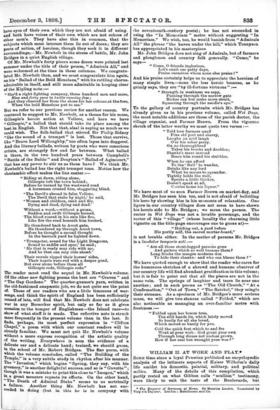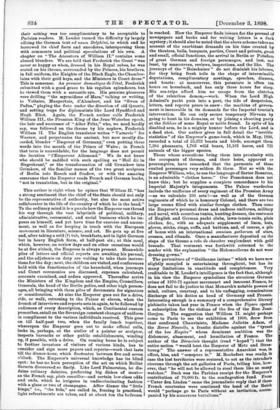WILLIAM II. AT WORK AND PLAY..
SOME time since a loyal Prussian published an encyclopaedic analysis of the intimate aspects of Kaiser Wilhelm's daily life amidst his domestic, palatial, military, and political milieu. Many of the details of this compilation, which partly rested on what Gibbon calls "scullion" testimony, were likely to suit the taste of the Boulevards, but • The Emperor of Germany at Home. By Maurice Leudet. Translated by Virg nia Tay:our. London : Hutchinson and CO. their setting was too complimentary to be acceptable to Parisian readers. M. Lendet turned the difficulty by largely editing the German text ad usum Delphini, to which end he borrowed its chief facts and anecdotes, interspersing them with comments and political speculations of his own. A chapter on " The Ancestors of William H." contains some absurd blunders. We are told that Frederick the Great "was never so happy as when, dressed in his Royal robes, he was seated on his throne, surrounded by the Princes, his brothers, in full uniform, the Knights of the Black Eagle, the Chamber- lains with their gold keys, and the Ministers in Court dress." This is nonsense. As premier domestique de l'etat, Frederick submitted with a good grace to his regalian splendours, but he viewed them with a sarcastic eye. His genuine pleasures were drilling " the myrmidons of Mars," talking or writing, to Voltaire, Maupertuis, d'Alembert, and his "Swan of Padua," playing the flute under the direction of old Qaantz, and setting traps for diplomatists like Lord Hyndford and Hugh Eliot. Again, the French author calls Frederick William III., the Prussian King of the Jena-Waterloo epoch, the heir and successor of "Alter Fritz," who, we need hardly say, was followed on the throne by his nephew, Frederick William IL The English translator writes " Varsovie " for Warsaw, and perpetuates the ancient, but now mostly dis- carded, blunder " Emperor of Germany," even putting these words into the month of the Prince of Wales ; in French that term is unavoidable, for the language does not permit the locution " l'Empereur Allemand." We do not know who should be saddled with such spelling as "Heil dir in Siegeskrant," or the transformation of old Granakow into Grimkow, of the familiar names of the two great sculptors of Berlin into Ranch and Scadow, or with the amazing assurance that the Emperor reads French and German books, " not in translation, but in the original."
This author is right when he opines that William II. "has a strong sentiment that the chief of the State should not only be the representative of authority, but also the most active collaborator in the life of the country of which he is the head." To the ordinary mind it is a puzzle how the Emperor can thread his way through the vast labyrinth of political, military, administrative, ceremonial, and social business which he im- poses on himself, and yet have time for exercise and amuse- ment, as well as for keeping in touch with the European movement in literature, science, and art. He gets up at five and, after taking a cold (P) tub, breakfasts, not in light German but in heavy English form, at half-past six ; at this meal, which, however, on review days and on other occasions would be at five o'clock, the Empress is always present. Meanwhile piles of letters and official reports are awaiting his perusal, and the adjutants on duty are waiting to take their instruc- tions for the day ; next, the children are visited, and conferences held with the functionaries of the household, when journeys and Court ceremonies are discussed, expenses calculated, accounts examined, and orders approved. Thereafter arrive the Ministers of the Kingdom and the Empire, Councillors, Generals, the head of the Berlin police, and other high person- ages, all bringing with them piles of documents for signature or consideration. At nine the Emperor goes out for a drive, ride, or walk, returning to the Palace at eleven, when the drench of interviews and reports sets in again, to be followed by audiences of every description, which, as Continental custom prescribes, entail on the Sovereign constant changes of uniform in compliment to the various individuals received. This goes on till half-past two, when the family lunch together, whereupon the Emperor goes out to make official calls, looks in, perhaps, at the atelier of a painter or sculptor, inspects barracks or other public establishments, winding up, if possible, with a drive. On coming home he is subject to further invasions of visitors of various kinds, has to consider and sign more papers and reports—work that lasts till the dinner-hour, which fluctuates between five and seven o'clock. The Emperor's universal knowledge has its blind spot: he has no keen perception of the art on which Brillat Savarin discoursed so finely. Like Lord Palmerston, he dis- dains culinary dainties, preferring big dishes of meat— as the French say, plats canailles—and certain low-class odds and ends, which he irrigates in undiscriminating fashion with a glass or two of champagne. After dinner the "little kings," i.e., "the kids," are called in, fencing is practised, light refreshments are taken, and at about ten the bedroom is reached. How the Emperor finds leisure for the perusal of newspapers and books and for writing letters is a dark mystery ; it should also be noted that the above scheme takes no
account of the exorbitant demands on his time created by the theatres, balls, banquets, parties, Court and private, great and small, official functions, the arrival in Berlin or Potsdam of great German and foreign personages, and last, not least, by manoeuvres, reviews, inspections, and the like. The journeys of the " Reisekaiser " do not diminish his labours, for they bring fresh toils in the shape of interminable deputations, complimentary meetings, speeches, dinners, and toasts : at mancenvres, this potentate is often tea hours on horseback, and has only three hours for sleep. His sea-trips afford him no escape from the clutches of the relentless demon,—work. When the Lord High Admiral's yacht puts into a port, the tide of despatches, letters, and reports pours in anew : the machine of govern. ment is inexorable in its demands for the Imperial tourist's intervention. He can only secure temporary Nirvana by going to hunt in his domains, or by joining a shooting party at the Schloss of some Royal or noble friend. In spite of his disabled arm, he is a mighty hunter before the Lord, and is a dead shot. Our author gives in full detail the "terrible statistics" of the Emperor's game-book, which in May, 1896, recorded a total of 25,372 beasts and birds, amongst them 7,384 pheasants, 1,703 wild boars, 11,161 hares, and 725 animals of the bigger species.
Those whose avocations bring them into proximity with the occupants of thrones, and their heirs, apparent or presumptive, have remarked that the garments of these exalted personages very seldom fit them. Not so with the Emperor William, who, to use the language of Sartor Resartus, is an admirable " clothes horse." Our Frenchman does not know this ; but he supplies a complete concordance to his Imperial Majesty's integuments. The Palace wardrobes include the uniforms of every regiment of the Prussian Army —as we calculate 250 sets l—as well as of the German regiments of which he is honorary Colonel, and there are two large rooms filled with similar foreign clothes. Then come the Emperor's personal dress and undress uniforms, military and naval, with countless tunics, hunting dresses, the costumes of English and German yacht clubs, lawn-tennis suits, plain clothes, &c., with an adequate supplement of linen, hats, gloves, sticks, rings, cuffs, and buttons, and, of course, a pile of boxes with an international omnium gatherum of stars, crosses, and ribands. Once a manufacturer deposited on the steps of the throne a robe de chambre resplendent with gold brocade. That vestment was forthwith returned to the sender with the explanation " the Hohenzollerns do not wear dressing gowns."
The portraiture of " Guillaume intime " which we have now slightly sampled is entertaining throughout, but has its many limitations in exactitude and completeness. Very creditable to M. Leudet's intelligence is the fact that, although in his view the Emperor symbolises the atrocious German crime of 1870-71 against sacrosanct and innocent France, he does not fail to do justice to that Monarch's notable powers of mind, culture, courtesy, and to his unflagging, conscientious discharge of his duties as head of Germany and Prussia.. Interesting enough is a summary of a comprehensive literary plebiscite taken last year in France when the Figaro opened a subscription for the victims of the fire of the Rue Jean- Goujon. The suggestion that William II. might perhaps come to Paris to see the exhibition of 1900, drew from that confirmed Chanviniste, Madame Juliette Adam, of the Revue Nouvelle, a frantic diatribe against the "tyrant of the bas Empire" whose dominant ambition was the dishonour, abasement, and humiliation of France. The author of the Deracines thought (read " hoped ") that the entire nation " would hoot the Emperor of Metz and Stras- bourg." The answer of a representative Anarchist was, in effect, hiss, and " conspuez le." M. Rochefort was ready, in case the lost territories were restored, to act as the intruder's cicerone through the art galleries of Paris, telling him, how- ever, that "he will not be allowed to steal them like so maul watches." Such was the Parisian receipt for the Emperor's contribution of 70,000 fr. to the conflagration fund. From "Mater den Linden" came the journalistic reply that if these French courtesies were continued the head of the Reich would "perhaps go to Paris without an invitation, accom- panied by his numerous battalions."























































 Previous page
Previous page